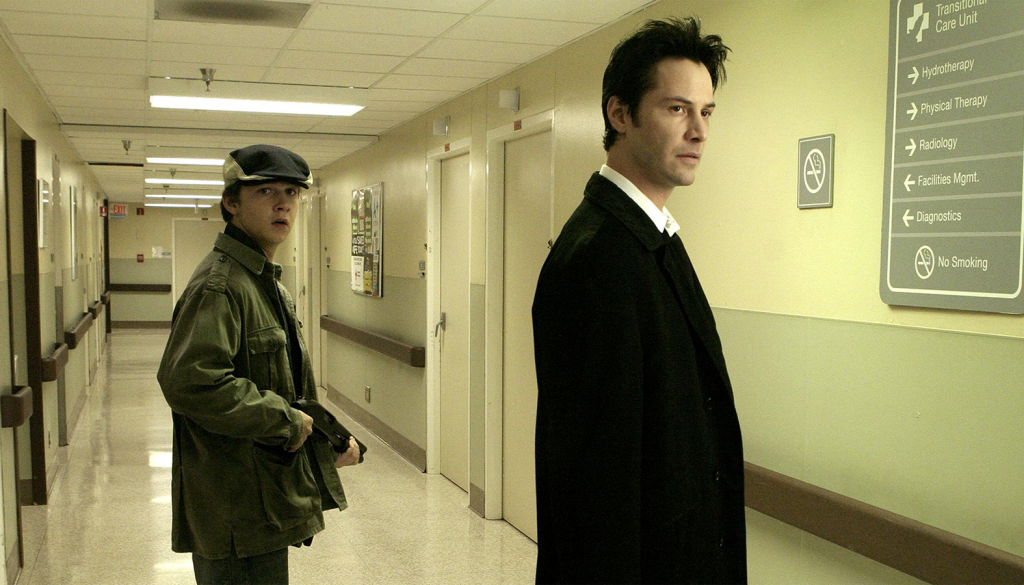To anyone who’s been paying attention, a recent interview of actor Shia LaBeouf with Bishop Robert Barron, in which he reveals his devotion to Catholicism as a result of portraying Padre Pio in a new film, has accomplished something remarkable.
The interview has the mainstream media and nonsecular media talking about the same things, from his embrace of the Traditional Latin Mass to the sins of his troubled past. It is quite something to see Slate and People covering the same topics that online Catholics rant about regularly.
And while one can only hope that LaBeouf finds the spiritual guidance he needs, I find myself hoping it also brings people to discover a film he made nearly 20 years ago that deeply features the Catholic faith.
Yes, I’m talking about “Constantine.”
“Constantine” stars Keanu Reeves as the titular John Constantine, a cynical exorcist who works to maintain the balance on earth between heaven and hell in a fight for the souls of mankind, all while trying to earn his own redemption. LaBeouf plays John’s “very appreciated apprentice,” learning the ropes of exorcisms.
LaBeouf’s arc in the film is an interesting one: apparently there to provide comic relief at first, his character’s sincerity ultimately shines through. He’s read all the books and his suggestions and knowledge spark the impetus for victory in the final battle. When he does finally have a chance to work alongside his jaded mentor, his moment to shine, an act of faith and inspiration, moves Constantine to greatness and sacrifice.
The film was the directorial debut of Francis Lawrence (who went on to direct “The Hunger Games” series) and Reeves was fresh off the success of “The Matrix” trilogy. John Constantine’s character was originally created in 1985 for DC Comics in the pages of “Swamp Thing,” and his own comic, “Hellblazer,” ran for 300 issues under DC’s critically adored Vertigo imprint, its longest running title. The pedigree and star power was all in place. There was no way it could fail.
The film flopped.
Released in February 2005, “Constantine” missed its moment. If it had been released in September or October it may have enjoyed a very different fate. “Batman Begins” would change things for comic book movies that summer, and “Iron Man” would change everything three years later with the launch of the Marvel Cinematic Universe. But in the dead of winter, “Constantine” opened with fanboys already primed to detest it: He’s not blond, he’s not Liverpudlian, Keanu ‘whoa’ Reeves can’t be Constantine!
In retrospect, wider audiences were not ready for a comic book movie with a main character who didn’t have a name on lunchboxes. Earning $75 million in the U.S. on a $100 million budget, it was savaged by critics and any hope of a franchise was quickly extinguished.
And yet, the movie is legitimately terrific and its reappraisal over the past 17 years, proven by its consistent plays on cable and streaming, has been well deserved. LaBeouf and the rest of the film’s all-star cast, including Rachel Weisz, Djimon Hounsou, Tilda Swinton, and Peter Stormare are all at the top of their games. Swinton as the Archangel Gabriel, reveling in her detached androgyny, commands every scene in which she appears. Stormare’s terrifying, charming, threatening, and playful Lucifer remains one of the best depictions of Satan on screen. And Keanu Reeves embodies the essence of Constantine so much better than the angry posters on Ain’t It Cool News’ message boards deserved.
He’s great. He understood the assignment and he respected the source material. There’s a reason he has publicly said he would love to play that part again, why fans nowadays are desperate for him to reappear in the DC Universe. He is John Constantine in this adaptation.
Lawrence directs the hell out of “Constantine.” Yeah, pun intended. It’s not just the cast that’s great, a peek through the credits reveals a stacked and talented crew. It’s a beautifully shot film, with moments that take my breath away to this day. The visual effects are superb, with a truly original depiction of hell and appropriately disturbing images of demons and possession, and the action sequences are fun and well done.
But “Constantine” is also a deeply Catholic film. Yes, it exaggerates and misinterprets, but at no point does it denigrate Christianity. Belief is taken as a given. Weisz’s characters (she plays twins, Angela and Isabel) are both devout Catholics and it informs their lives. Constantine himself is searching for redemption for a past sin, and while his reasons for saving souls may be selfish and cynical, he puts himself between the devil and the innocent. (Plus, the film has Constantine wielding a crucifix shotgun to dispatch demons. When’s the last time you saw a film like that?)
“Constantine” ends with hope and salvation, the kind promised to those like LaBeouf who walk down the path of Catholicism. Indeed, the post-credits kicker (which Marvel would turn into an art a few years later) seems bizarrely prescient given recent developments. And if that happens to make a few people watch “Constantine”? Well, that’s a solid bonus, because the film flat out slaps.
“Constantine” is currently available to stream on Netflix and HBO Max.

